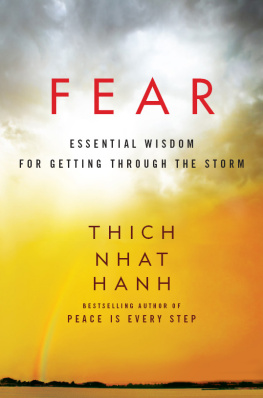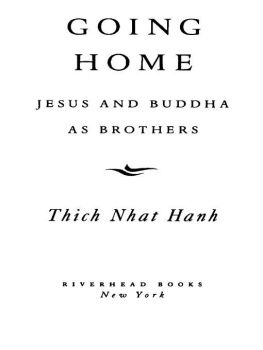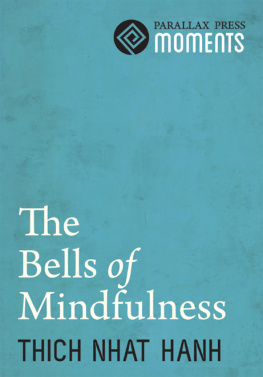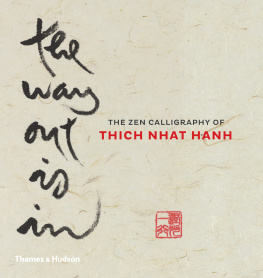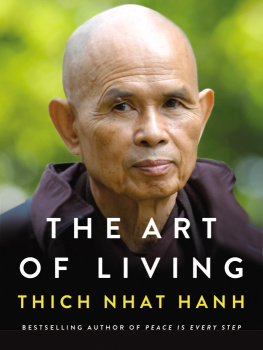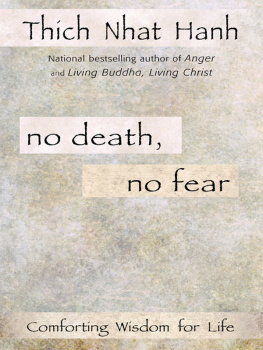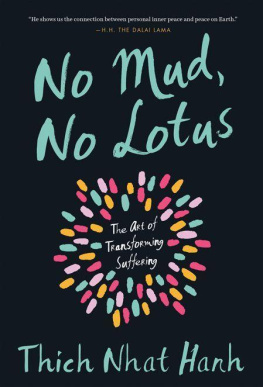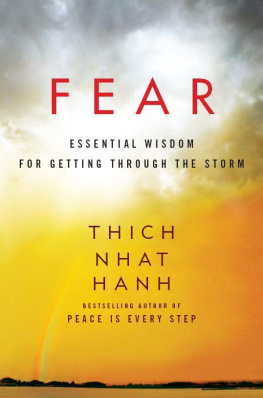
THICH NHAT HANH
FEAR
ESSENTIAL WISDOM FOR
GETTING THROUGH THE STORM

Contents
INTRODUCTION
Fearlessness
Most of us experience a life full of wonderful moments and difficult moments. But for many of us, even when we are most joyful, there is fear behind our joy. We fear that this moment will end, that we wont get what we need, that we will lose what we love, or that we will not be safe. Often, our biggest fear is the knowledge that one day our bodies will cease functioning. So even when we are surrounded by all the conditions for happiness, our joy is not complete.
We think that, to be happier, we should push away or ignore our fear. We dont feel at ease when we think of the things that scare us, so we deny our fear away. Oh, no, I dont want to think about that. We try to ignore our fear, but it is still there.
The only way to ease our fear and be truly happy is to acknowledge our fear and look deeply at its source. Instead of trying to escape from our fear, we can invite it up to our awareness and look at it clearly and deeply.
We are afraid of things outside of ourselves that we cannot control. We worry about becoming ill, aging, and losing the things we treasure most. We try to hold tight to the things we care aboutour positions, our property, our loved ones. But holding tightly doesnt ease our fear. Eventually, one day, we will have to let go of all of them. We cannot take them with us.
We may think that if we ignore our fears, theyll go away. But if we bury worries and anxieties in our consciousness, they continue to affect us and bring us more sorrow. We are very afraid of being powerless. But we have the power to look deeply at our fears, and then fear cannot control us. We can transform our fear. The practice of living fully in the present momentwhat we call mindfulness can give us the courage to face our fears and no longer be pushed and pulled around by them. To be mindful means to look deeply, to touch our true nature of interbeing and recognize that nothing is ever lost.
One day during the Vietnam War, I was sitting in a vacant airfield in the highlands of Vietnam. I was waiting for a plane to go North to study a flooding situation and help bring relief to the flood victims. The situation was urgent, so I had to go in a military plane that was usually used to transport such things as blankets and clothing. I was sitting alone in the airfield waiting for the next plane when an American officer came up to me. He was also waiting for his plane. It was during the war, and there were only the two of us at the airfield. I looked at him and saw that he was young. Immediately, I had a lot of compassion for him. Why does he have to come here to kill or be killed? So out of compassion I said, You must be very afraid of the Viet Cong. The Viet Cong were Vietnamese communist guerrillas. Unfortunately, I wasnt very skillful, and what I said watered the seed of fear in him. He immediately touched his gun and asked me, Are you a Viet Cong?
Before coming to Vietnam, U.S. Army officers had learned that everyone in Vietnam could be a Viet Cong, and fear inhabited every American soldier. Every child, every monk, could be a guerrilla agent. The soldiers had been educated this way, and they saw enemies everywhere. Id tried to express my sympathy to the soldier, but as soon as hed heard the word Viet Cong hed been overwhelmed by his fear and went for his gun.
I knew I had to be very calm. I practiced breathing in and breathing out very deeply and then said, No, I am waiting for my plane to go to Danang to study the flooding and see how I can help. I had a lot of sympathy for him, and this came through in my voice. As we talked, I was able to communicate that I believed the war had created a lot of victims, not only Vietnamese but also Americans. The soldier calmed down as well, and we were able to talk. I was safe, because I had enough lucidity and calm. If I had acted out of fear, he would have shot me out of his fear. So dont think that dangers come only from outside. They come from inside. If we dont acknowledge and look deeply at our own fears, we can draw dangers and accidents to us.
We all experience fear, but if we can look deeply into our fear, we will be able to free ourselves from its grip and touch joy. Fear keeps us focused on the past or worried about the future. If we can acknowledge our fear, we can realize that right now we are okay. Right now, today, we are still alive, and our bodies are working marvelously. Our eyes can still see the beautiful sky. Our ears can still hear the voices of our loved ones.
The first part of looking at our fear is just inviting it into our awareness without judgment. We just acknowledge gently that it is there. This brings a lot of relief already. Then, once our fear has calmed down, we can embrace it tenderly and look deeply into its roots, its sources. Understanding the origins of our anxieties and fears will help us let go of them. Is our fear coming from something that is happening right now, or is it an old fear, a fear from when we were small, that weve kept inside? When we practice inviting all our fears up, we become aware that we are still alive, that we still have many things to treasure and enjoy. If we are not busy pushing down and managing our fear, we can enjoy the sunshine, the fog, the air, and the water. If you can look deeply into your fear and have a clear vision of it, then you really can live a life that is worthwhile.
Our greatest fear is that when we die we will become nothing. To really be free of fear, we must look deeply into the ultimate dimension to see our true nature of no-birth and no-death. We need to free ourselves from these ideas that we are just our bodies, which die. When we understand that we are more than our physical bodies, that we didnt come from nothingness and will not disappear into nothingness, we are liberated from fear.
The Buddha was a human being, and he also knew fear. But because he spent each day practicing mindfulness and looking closely at his fear, when confronted with the unknown, he was able to face it calmly and peacefully. There is a story about a time the Buddha was out walking and Angulimala, a notorious serial killer, came upon him. Angulimala shouted for the Buddha to stop, but the Buddha kept walking slowly and calmly. Angulimala caught up with him and demanded to know why he hadnt stopped. The Buddha replied, Angulimala, I stopped a long time ago. It is you who have not stopped. He went on to explain, I stopped committing acts that cause suffering to other living beings. All living beings want to live. All fear death. We must nurture a heart of compassion and protect the lives of all beings. Startled, Angulimala asked to know more. By the end of the conversation, Angulimala vowed never again to commit violent acts and decided to become a monk.
How could the Buddha remain so calm and relaxed when faced with a murderer? This is an extreme example, but each of us faces our fears in one way or another every day. A daily practice of mindfulness can be of enormous help. Beginning with our breath, beginning with awareness, we are able to meet whatever comes our way.
Fearlessness is not only possible, it is the ultimate joy. When you touch nonfear, you are free. If I am ever in an airplane and the pilot announces that the plane is about to crash, I will practice mindful breathing. If you receive bad news, I hope you will do the same. But dont wait for the critical moment to arrive before you start practicing to transform your fear and live mindfully. Nobody can give you fearlessness. Even if the Buddha were sitting right here next to you, he couldnt give it to you. You have to practice and realize it yourself. If you make a habit of mindfulness practice, when difficulties arise, you will already know what to do.
Next page
